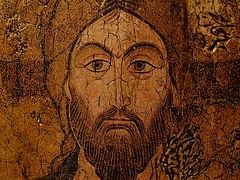Matt. 22:35-46:
Then one of them, which was a lawyer, asked Him a question, tempting Him, and saying, Master, which is the great commandment in the law? Jesus said unto him, Thou shalt love the Lord thy God with all thy heart, and with all thy soul, and with all thy mind. This is the first and great commandment. And the second is like unto it, Thou shalt love thy neighbour as thyself. On these two commandments hang all the law and the prophets. While the Pharisees were gathered together, Jesus asked them, Saying, What think ye of Christ? Whose Son is He? They say unto Him, The son of David. He saith unto them, How then doth David in spirit call Him Lord, saying, The Lord said unto my Lord, Sit thou on my right hand, till I make thine enemies thy footstool? If David then call Him Lord, how is He his son? And no man was able to answer Him a word, neither durst any man from that day forth ask Him any more questions.
Today’s passage from the Gospel of Matthew is, I think, known to just about everyone. There are few who are interested in Christianity but don’t know that Jesus Christ spoke about the two greatest commandments: love for God and love for neighbor, upon which stands the entire Law.
But if we listened attentively to today’s narrative, then the first question that could arise is why is the lawyer’s question to Christ identified by the Evangelist as a temptation? Why does he write that he asked Him a question, tempting Him? What were they hoping to catch Jesus Christ, the teacher from Nazareth, in by asking what is the greatest and most important commandment?
The fact is that within the multitude of regulations given in the Old Testament and brought to us by the prophet and God-seer Moses, it was very difficult to single out those that were most important. There were the Ten Commandments, known as the Sinai Commandments, and a multitude of other ordinances recorded in the first five books of the Sacred Scriptures of the Old Testament, more or less important. Entire schools of teachers and interpreters were formed, who reasoned about which of these commandments was the most important and what to do if there is an external contradiction between commandments or ordinances. Relations between these schools were quite painful. Accordingly, the design of those who tempted Christ was, no matter what answer He gave, to find the opinion of an authoritative teacher who thought otherwise and to bring Christ’s answer into conflict with him and thereby say that He was not a genuine prophet of God and interpreter of Sacred Scripture for the people to follow; and therefore, there was no way He could be the Messiah, the Christ.
But the Lord answered in a manner completely unexpected for them: He quoted the Old Testament. We shouldn’t think the Old Testament contains no words about love for God or love for neighbor, although they were never placed together and were not indicated as the main commandments. But it was said so strongly that Christ’s opponents couldn’t find an answer. When the word of God is spoken with such force, as in today’s narrative, it can stop the wicked and insincere.
What truth was there in these words? First, speaking about how these commandments were the first and most important, the Lord does not say that they abolish the others. Yes, these commandments crown the books of Moses and the prophets, but they don’t suggest such love can be achieved without observing the remainder of the laws, statutes, regulations, and ordinances in Sacred Scripture.
This is very important in our time when the word “love,” first, is understood as dimensionless and expansive; second, is given any sense people want, all the way up to “make love”; and third, people tend to think that a broadly-understood love exceeds all other laws. That is, if I love, then I can transgress moral precepts, the criminal code, my duties towards others, and so on. People sometimes try to find justification in the Sacred Scriptures for such a choice and outlook.
The beloved disciple of Christ the Apostle and Evangelist John the Theologian says in his first Epistle, a few decades after the events described in the Gospel: Perfect love casts out fear (1 Jn. 4:18). In these words, the definition of “perfect” is very important.
Indeed, he who has attained perfection and abides in the love of God, for whom love is not a fallen state but the inner content of being and essence of man, is no longer afraid of sinning, whether voluntarily or involuntarily. But how many of us can say about ourselves that we are in such a state or can really imagine what it consists of? At best, we experience it as moments of insight. But to live in perfection is a state infinitely far from us. Therefore, it is by fulfilling the other commandments that we can learn to love.
Elsewhere in the Gospel, Christ says: If you love Me, keep My commandments (Jn. 14:15). That is, if you want to learn, or at least go down the path of learning this perfect love, then do not think that it can be done by abolishing the Decalogue of Moses with its, “Thou shalt not steal,” “Thou shalt not covet thy neighbour's wife,” “Honour thy father and thy mother,” “observe the hierarchy of values between work and feasts,” and much else. A Christian will certainly understand that it is impossible to learn this love without observing the commandments on prayer, fasting, and restrictions.
There is one more important point that must be said in connection with today’s Gospel reading. Christ distinctly testifies that all the other commandments, if they do not lead a man to fulfill the commandment of love, are completely meaningless. If a man does not love God and does not set this main spiritual goal for himself, then his other efforts could even go in the opposite direction. Piety becomes fanaticism, zeal—cold asceticism, which doesn’t do anybody any good, love for the liturgical order—rote learning, and fulfilling the commandment to pray—empty formalism.
The Apostle Paul says: And though I have the gift of prophecy, and understand all mysteries, and all knowledge; and though I have all faith, so that I could remove mountains, and have not charity, I am nothing (1 Cor. 13:2). And this twofold testimony about how we move towards knowledge of love through the Law and that there is no other way, and that if the works of the Law do not have this purpose, they become empty and meaningless—this is what Christ reminds us of in today’s Gospel.




